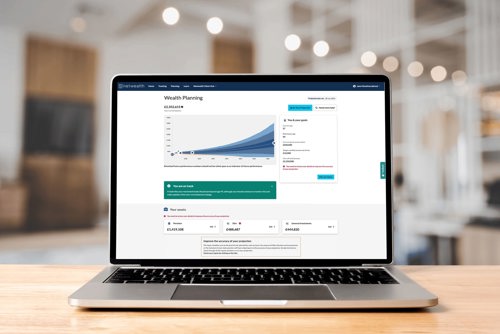Financial planning in your 50s: are you on track?

For many, their 50s is a time to take stock and see if they are on track for the rest of their life. It’s a good opportunity to review your circumstances as there is plenty of time to maximise your financial potential – and make corrections if you find out you are not making the right decisions to meet your goals and secure a comfortable retirement.
Ensure you are being tax efficient
You will no doubt be aware of the benefits of tax wrappers such as pensions and ISAs, but are you keeping up to date with your contributions? And are you sure you are using them in a way to encourage meaningful growth?
For your contributions you should ensure you are using the most you can afford up to the maximum of £60,000 a year for a pension and £20,000 a year for an ISA (£9,000 a year for Junior ISAs). You may have other investments outside of these wrappers (eg, property, cars) so it is worth evaluating whether these are still an ideal long-term home for your money (and your time) – and whether they are as efficient as they could be.
It’s sometimes hard to extricate what is a passion from what is a genuine investment that may support your future, so it is worth evaluating which assets should go in which pot, as we do in this article.
When it comes to meaningful growth, we refer to the potential for your assets to outpace inflation. This is not easily achieved through cash savings alone – in fact, it’s rare.
From 2007 to the end of 2024, including the downturn of 2008/2009, you were in a much better position if you were invested compared to leaving your money in savings. For example, by investing in a Netwealth medium risk portfolio (risk level 4) you would have seen a return almost £50,000 higher (£115,591 vs £66,453) compared to cash savings being depleted by inflation.
(Simulated historic performance is not a reliable indicator of future results. Source: Netwealth and Bloomberg. The values represent £100k invested in 1 month Libor (a wholesale interest rate) and an example Netwealth Risk Level 4 portfolio indexed to 2007 prices. Data to end of December 2024.)
It’s frankly astonishing how much money is left in cash ISAs, the real value of which deteriorates substantially over time, as we show above. According to 2025 research by the Investment Association¹, less than a third of UK adults hold a cash ISA, while only around half that have a Stocks & Shares ISA. Therefore, the opportunities for higher adoption of suitable tax-free wrappers remain remarkable – and one you should explore if you are not doing so already.
Consider consolidating your pensions
It’s not unusual to have two pension pots or more when you reach 50 – yet how you invested previously may not be ideal to support your future. The investment landscape, regulations and efficiencies have evolved substantially over the last 20-30 years. Are your pension plans still fit for purpose now? Could you, in effect, be losing money every year because your pensions may be taking too much or too little risk for you to achieve your goals? Or if they are just not invested wisely?

Simplifying your finances could give you more money to spend on those you care about.
It’s vital in your 50s to evaluate your pensions and to consider whether you might be better served by bringing them together. This article on pension consolidation explores the many benefits of doing so – such as simplifying your finances, making more of your money and potentially maximising growth. You should at least assess how diversified your pensions are now, and how much you are paying in fees to invest each year.
If you then decide that your pensions could do with a boost, we explain how easy it is to move to a provider that may be more in tune with how you live – and manage your money – today.
Check how much you are paying to invest
One of the main reasons why people change pension provider is when they realise how much they are being overcharged by someone to manage their pot. Reducing these fees will directly affect how much more money you have available to invest.
We often highlight the difference lower fees make to your financial outcome at Netwealth – and for good reason. If you are in your 50s you may have 20 years before you draw from your personal pension, so let’s explore how much of an impact you could make to your retirement fund if you act in time.
Let’s look at a 20-year timeframe from age 50, with a pot built up of £300,000. If we assume an average yearly return of 6% and 1% in fees, this pot could grow to £917,730 by the time they reach 70. With the same assumptions but paying 2% in fees, the pot would only grow to £766,489 – over £150,000 less to spend in retirement. Think of the extra holidays, a property abroad, or how much more you could leave to loved ones by choosing to pay 1% less in fees. And it is a choice.
Note: this is a straightforward calculation, not taking into account inflation nor the benefits of tax wrappers to shelter wealth, such as the tax relief you get when paying into a pension.
Work out what you might need for the future
Guesswork won’t do – you should have a good idea how much money you will need later in life, and you can then organise to see how you will get there. Everyone needs a resilient financial plan, and to revisit it regularly to see if they are still on track.
Most people in their 50s will benefit from cashflow modelling if they haven’t taken this step already. This forms a key part of our financial advice service (you can make an appointment here). Cash flow modelling builds a model of your financial position over time, taking into account inflows and outflows – and factoring in variables such as inflation, how to efficiently use tax wrappers and investment returns – to assess how you can achieve your goals.
It can help you answer some of life’s most pressing questions. When can you retire? How much can you (and should you) save every month to achieve your objectives? Can you afford to buy your retirement dream cottage? Or fund a once-in-a-lifetime family adventure? This article explores the possibilities that cashflow modelling could enable in more detail.
Expert financial advice, from a team that has helped thousands in similar situations, typically pays for itself many times over, as International Longevity Centre findings show² – and can help you unlock considerable benefits to help you secure your financial future.
Even if you don’t feel you need full financial advice, what we call a Financial MOT offers a hassle-free and thorough check-up of your financial health. Personalised insights and expert guidance help you better understand the potential effects of the decisions you have made so far in life – and give you the direction you need to make any changes to your plans. For a clear and actionable picture of your finances, sign up here.
We also offer powerful tools so you can visualise various potential financial outcomes and track all your investments in one place – for no cost or commitment. Check out the user-friendly interface and explore different permutations (such as investment returns, timeframe, risk and more) to see if your retirement objectives can be realistically achieved – or if you need to take action to realise your goals.

Our powerful tools give you greater financial clarity and help you to plan with confidence.
Financial mistakes to avoid in your 50s
As important as getting it right are the factors that could hinder you from achieving your goals. Knowing these common mistakes could help you avoid them.
- Accessing your pension too soon. While the pension freedom reforms allowed many to dip into their pension from age 55 (57 from 2028), it’s obviously better for your future retirement pot to let it grow further. And once you access your pension (apart from tax-free lump sums) how much you can save into it afterwards reduces to £10,000, and not up to £60,000 as otherwise applies.
- Being too cautious. There may be a temptation to – or you may be poorly advised that you should – take less risk in your 50s. But if you have a decent amount of time until you retire, it could be better to still aim for growth by taking more risk, as returns are usually smoothed out over time. Understanding the impact of taking risk is key, a topic we explore in detail here.
- Not saving enough. The compounding effect of saving regularly can be considerable, as can be the impact of not doing so. We’ve mentioned the value of tax wrappers above and many employers will also match contributions, so you should make the most of this boost if you are employed. Note that contributions benefit from tax relief if you are self-employed, too.
- Not having a clear plan. It’s important to have clear goals – for when you want to retire, and for how much you think you will need to live on. Make that plan, use cashflow modelling, face the future with more certainty.
- Not putting yourself first. Before you consider gifting to the next generation you should first ensure you have enough to fund your own retirement. If you give away too much money to loved ones before you retire you might not have enough to support yourself in retirement – considering that it might last longer than you think.
Summary
We hope this list of things you should consider in your 50s is useful, yet we recognise this is not an exhaustive inventory of what to assess. Everyone’s situation is different: some, for example, may have more complex personal circumstances with family trusts and others may have more subtle demands regarding the balance of tax free and general investments.
We encourage you to get in touch if you have any queries about how to be better prepared financially in your 50s. You might want an impartial assessment of your plans, or need help to refine them. Whatever your needs, please get in touch.
Please note, the value of your investments can go down as well as up.
Netwealth offers advice restricted solely to our services. We do not consider the whole of the market, nor offer advice in relation to tax compliance, insurance products, or the transfer of defined benefit pensions.